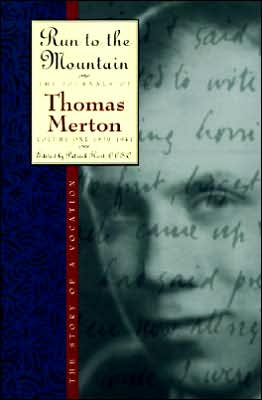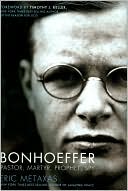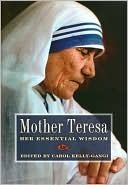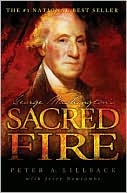Run to the Mountain: The Story of a Vocation: The Journal of Thomas Merton, Volume 1: 1939-1941
When Thomas Merton died accidentally in Bangkok in 1968, the beloved Trappist monk's will specified that his personal diaries not be published for 25 years — presumably because they contained his uncensored thoughts and feelings. Now, a quarter of a century has passed since Merton's death, and the journals are the last major piece of writing to appear by the 20th century's most important spiritual writer.\ The first of seven volumes, Run to the Mountain offers an intimate glimpse at the inner...
Search in google:
When Thomas Merton died accidentally in Bangkok in 1968, the beloved Trappist monk's will specified that his personal diaries not be published for 25 years — presumably because they contained his uncensored thoughts and feelings. Now, a quarter of a century has passed since Merton's death, and the journals are the last major piece of writing to appear by the 20th century's most important spiritual writer. The first of seven volumes, Run to the Mountain offers an intimate glimpse at the inner life of a young, pre-monastic Merton. Here readers will witness the insatiably curious graduate student in New York's Greenwich Village give way to the tentative spiritual seeker and brilliant writer. Merton playfully lists everything from his favorite lines of poetry and songs to the things he most loves and hates. Thomas Merton was an inveterate diarist; his journals offer a complete and candid look at the rich transformations of his adult life. As Brother Patrick Hart, general editor of the series notes, "Perhaps his best writing can be found in the journals, where he was expressing what was deepest in his heart with no thought of censorship. With their publication we will have as complete a picture of Thomas Merton as we can hope to have." Catholic News Service When all the journals are published, it is likely that they will take their place with the famous journals of Henry David Thoreau, G.M. Hopkins, Edmund Wilson, and prhaps be seen as an American version of St. Augustine's 'Confessions.'
Chapter One\ \ \ Tuesday, May 2, I939. New York\ This is May. Who seen any robins?\ Cicero, De Oratore, recommends stamping your foot during your speech. At least at the beginning of the speech and at the end. CaiusGracchus had a servant stand behind him with an ivory flute to play the proper note, and regulate the pitch of the orator's voice if he weregetting too low or too high or too furious.\ A girl on a street corner stamping her feet to make the men turn around.\ Saint Augustine's problems are everybody's, except be did not have a war to worry him. The 12th Chapter of Book VII is magnificent. Evilthe deficiency of good. Everything that is, is good, by virtue of its mere existence. Corruptibility implies goodness.\ Would have gone to the World's Fair today but did not. Yesterday was New Haven day at the Fair. Some thousands came from N.H. [NewHaven] with books of tickets. On each book was pasted a dime for the Long Island R.R. turnstile. The glue on the dimes mucked up theslots in the turnstiles and the. whole damn business was put out of order.\ [John] Berryman is right about Wordsworth being a good poet. I read his sonnets in the Oxford Book today. "The Trosachs" is good, so is"Nuns fret not," which I should have remembered. Then I had forgotten "Or hear old Triton blow his wreathed horn" which is a swell sonnet-- a good last line to a good sonnet. "The Trosachs." Three sentences.\ May 3The Columbia Writers Cub: run by the Extension English Department, proud of courses in playwriting, poetry writing, short story writing,etc. I was one of some twelve speakers, and had to talk about poetry, so named some poets Iliked and said poetry was serious, and peoplewho wanted to write poetry should read poetry and sat down feeling horrible. Peter Munro Jack who made the first, biggest, and after minethe most nervous speech came up and said I had done a good thing. He had said poetry was the best thing being written now.\ I still wish I were teaching English even if it meant going to every Writers Club Banquet ever given. Beef all night, and one glass of wine toevery writer.\ May 4Beer after the nightmare society's banquet did me ill but I walked in the sun and went to the World's Fair. I like fairs. The colossal statuesare awful, the trees and gardens good, the Turkish Pavilion, with music by real violins and pianos, and Pilav for 80 cents was a good place toeat. The Amusement Place is all jagged and has gaps between its teeth that let us see Flushing and its cemeteries. The hours on the bussesthat play part of "East Side West Side" will kill the Fair dead in the middle of August. So will all the canned Tchaikovsky that blows aroundamong the fat statues. In the Amusement Section, an exhibit of "Natures Mistakes" -- lambs with five legs, cats with two, etc. Oh no, I didnot go.\ May 11I suppose I am not reading Croce on Vico very carefully. I am not getting the steps in the law of reflux so well down. Yet as to Finnegan'sWork: The very first sentence says it's Vico. So Finnegan is the history of the world, seen Vician. And that is clear enough, what with Jarlvan Hoother and the Norses and Outlanders. I like the interviews in pp. 60's. But Jarl Van H. and the Prankquean made me happy to thepoint of singing all weekend, notwithstanding Pernod, rum, scotch, beer, arroz con pollo, coca cola, roast beef sandridges and abouteverything except barley candy out at the Fair.\ I like the fellow Amasis, who before being King would drink and sing and steal for fun, and then they would take him to the oracles andsome would say guilty and some not guilty. So when he was King he rewarded the oracles that had said "guilty" and spat on the others for atroop of phonies, and so had his intelligent jest. This one is from Herodotas, but Finnegan too I suppose. For Finnegan's Walk is allaround the world, and that has Egypt.\ May 12Today has the sort of clean sky and coldness of air and brightness all over, to make all things sharp and every line keen shapes firm colorsbright that fall has. The effect was funny on me; I have been playing spring and so has the weather so that I had ceased to remembereverything about last fall or almost any fall, and certainly stopped believing in last fall. Then I was tutoring the fat girl at Central Park West,and would go with my Cicero, and afterwards walk in the sun and go to Saint Gregory the Great for a few minutes, that being a dark flatbasilica with no windows and so outside and more cold sun.\ Or I would sit at a desk mornings in the Tutoring School reading or typing, and so I typed the Thesis and did an article on Crashaw. Last fallI worked hard and today I am up and working too -- getting notes on Bridges' Milton's Prosody and everything is pretty gay.\ Always forgetting the beginnings of fall, you always hit a day like them early in summer and you are pleased and that means it is the firsttime you really have put winter away out of your mind. Never think of fall in winter, yet in summer you think of it: it is going to be cool. Andit is too. September and October are fine months.\ So is May a fine month. But today is funny. Even scratch yourself and it is more like scratching yourself in autumn. And oh yes, last fall Iwas riding the busses up to the Hispanic Society Museum and looking at the El Grecos.
AcknowledgmentsThe Scribe's IntroductionPt. IThe Novitiate Journal: December 1941-April 19421Pt. IIA Journal-Memoir: Dom Frederic Dunne: October 1946-August 194813Pt. IIIThe Whale and the Ivy: December 1946-July 195229The Daily Schedule at Gethsemani During the 1940s489A Glossary of Monastic Terms490Index493
\ Thomas MooreThe trick is always to find the spiritual deeply embedded in this world, and to discover our own eternal dimensions in the midst of our foibles, failures, and sometimes neurotic idiosyncrasies. We have no better guide in these things than Merton, and you couldn't ask for a more lively writer.\ \ \ \ \ Catholic News ServiceWhen all the journals are published, it is likely that they will take their place with the famous journals of Henry David Thoreau, G.M. Hopkins, Edmund Wilson, and prhaps be seen as an American version of St. Augustine's 'Confessions.'\ \ \ Boston GlobeA rich introduction to [Merton's] vivid imagination.\ \ \ \ \ Kirkus ReviewsThis volume of journals reveals Merton in his late 40s, already pulled by the tension between spiritual interiority and social activism that was to characterize his final years.\ By 1960 Merton was an internationally renowned figure. His bestselling Seven-Storey Mountain (1948) had been ranked alongside St. Augustine's Confessions, and in a steady stream of books and articles he had explored monastic spirituality in a way that seemed fresh and relevant to a wide public. The themes in this volume of his journals show a definite shift away from his earlier otherworldliness. Kramer (English/Georgia State Univ.) has divided the manuscript chronologically into four parts. We see Merton at last obtaining the unusual permission from his abbott at Gethsemani to live in a hermitage, yet meeting a growing number of thinkers and representatives of other faiths in his retreat. Even before Vatican II begins, he is involved in the issues of liturgical reform, ecumenism, and especially the Church's attitude to the modern world. The Cuban missile crisis and the apparent inevitability of nuclear war loom large. Merton considers the need for Christians, including himself, to speak out against the Vietnam War and social segregation, while the writings of Hannah Arendt and the Eichmann case force him to think more deeply about the Catholic understanding of obedience. These pages are characterized more by breadth than depth. Although there is much personal questioning, spiritual musing, and notes from Merton's extensive reading and worldwide correspondence, most readers would do better to turn to Conjectures of a Guilty Bystander (1966), which contains the developed fruits of these jottings.\ Strictly for Merton connoisseurs.\ \ \








